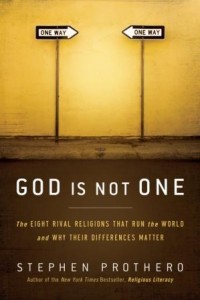 About God Is Not One
About God Is Not One
God Is Not One is a major book in the tradition of classics like Karen Armstrong’s A History of God and Jack Miles’s God: A Biography. Author and religion scholar Stephen Prothero’s controversial follow-up to his New York Times bestseller Religious Literacy debunks the popular myth that all religions are “different paths to the same God.” Contrary to what many popular religion writers (Wayne Dyer, Huston Smith) say, we actually disrespect the core of each religious tradition when we treat them as if they were indistinguishable. And we do so at our own peril.
God Is Not One shows how the world’s religions ask different questions, tackle different problems, and aim at different goals. In Religious Literacy, Prothero revealed how little Americans know about their own religions and why religious studies should be taught in public schools. Now, Prothero provides readers with this much-needed content about each of the major religions. He begins with Islam, which of all the great religions has had the greatest contemporary impact. He then moves on (in order of influence) to Christianity, Confucianism, Buddhism, Hinduism, Judaism, Yoruba religion, and Daoism. Along the way, he highlights the unique aspects of these religions and argues for their preservation as separate paths to different gods and different goals.
To claim that all religions are the same is to misunderstand that each tradition attempts to solve a different aspect of the human condition. For example:
- Islam: the problem is pride / the solution is submission
- Christianity: the problem is sin / the solution is salvation
- Confucianism: the problem is chaos / the solution is social order
- Buddhism: the problem is suffering / the solution is enlightenment
- Hinduism: the problem is the endless cycle of reincarnation / the solution is release
- Judaism: the problem is exile / the solution is our return back to God and to our true home
When we gloss over these differences we fail to appreciate each religion on its own terms.
Prothero provides an up-to-date look at the religions that continue to shape the spiritual lives of billions of people around the globe and in many cases determine their economic and political destinies. His polemical argument that the great religions are different paths up different mountains creates a new context for the study of religion in the 21st century and disproves the assumptions most of us make about the way the major religions work.
 About Stephen
About Stephen
Stephen Prothero is a professor in the Department of Religion at Boston University and the author of numerous books, most recently American Jesus: How the Son of God Became a National Icon (Farrar, Straus & Giroux, 2003) and the New York Times bestseller Religious Literacy: What Americans Need to Know (HarperOne, 2007). He has commented on religion on dozens of National Public Radio programs, and on television on CNN, NBC, MSNBC, FOX, and PBS. He was also a guest on “The Daily Show” with Jon Stewart and “The Oprah Winfrey Show.” A regular contributor to the Wall Street Journal and USA Today, he has also written for the New York Times Magazine, the New York Times Book Review, Slate, Salon, the Washington Post, the Los Angeles Times, and the Boston Globe. Prothero received his BA from Yale in American Studies and his PhD in the Study of Religion from Harvard. He lives on Cape Cod, and he tweets @sprothero.
Visit Stephen’s website at stephenprothero.com.
Stephen’s TLC Book Tours Tour Stops
Thursday, April 15th: Pagan Godspell
Wednesday, April 21st: change therapy
Monday, April 26th: Diamonds in the Sky With Lucy
Tuesday, April 27th: Random Thoughs of a Lutheran Geek
Wednesday, April 28th: Amy Reads
Thursday, April 29th: Happy Lotus
Monday, May 3rd: Knowing the Difference
Tuesday, May 4th: A Church for Starving Artists
Wednesday, May 5th: Anchors and Masts
Monday, May 10th: Confessions of a Pagan Soccer Mom
Tuesday, May 11th: Don’t Eat Alone
Thursday, May 13th: SMS Book Reviews
Sunday, May 23rd: Journey With Jesus
Literary Feline says
I confess I’m one of those people who tends to think different religions all lead to the same God. This sounds like a fascinating book. I’ve been wanting to read Karen Armstrong’s books for awhile now. And now seeing this book makes me wonder if I should have a religious themed month–finally get to that AJ Jacobs book on my shelf.
I’ll have to make note of this title and look into it further.
Ivan Soto says
The book should be worth the money, effort, and time if only because it appears to draw an analytically multidimensional homologous structure to highlight the differences among major religions and their consequences for our world. Nice formula the author has found, as the grand arbiter among the religions and between them and those without religion. The slot that opens up is more challenging yet: the meta-arbiter.
Jim Davey says
Just witnessed the CSAN2 AfterWords interview of author Stephen Prothero about the book God Is Not One. Pithy. Searched for a transcript of that interview, and have not been able to find one. Anyone know how I might get that transcript? Thank you, and yes I will be buying the book next trip to town.